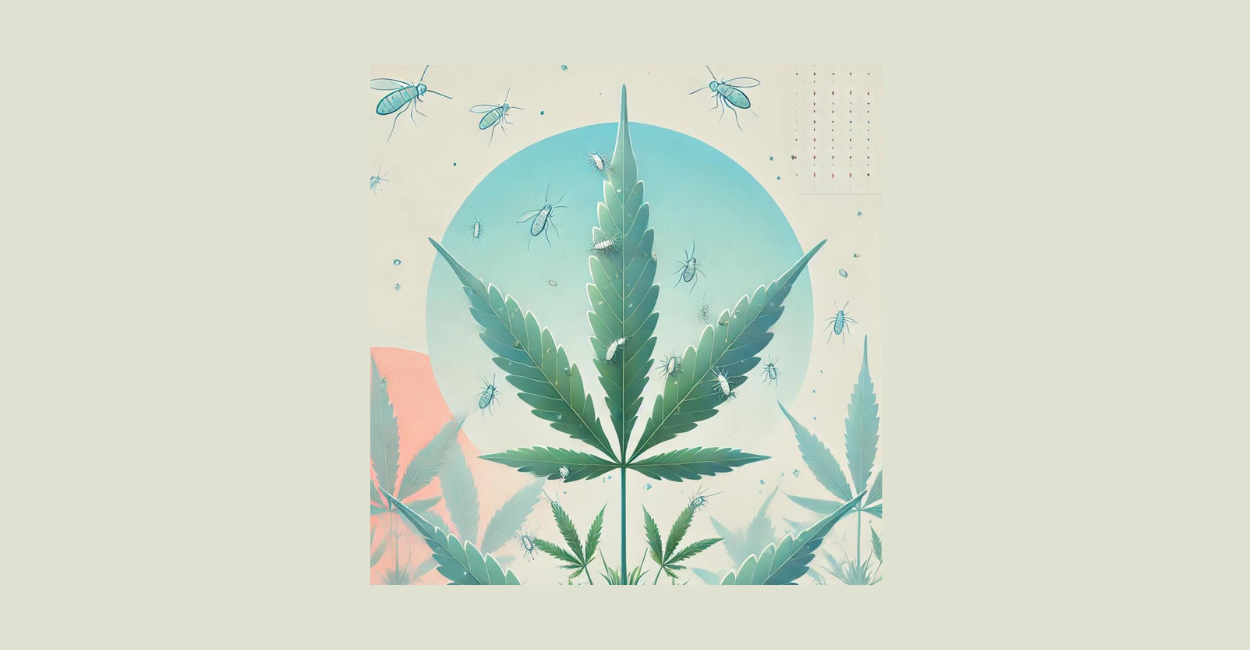The Role of Aphids in Cannabis Cultivation
Aphids are small, sap-sucking insects that can significantly affect the health and yield of cannabis plants. These pests vary in color from green to black, red, and white, and range from 1 to 10 millimeters in size. Similar to Thrips, they suck the plant sap and leave damage on the leaves, leading to growth disorders and yield losses.
Signs and Symptoms of Aphid Infestation
Early identification of an aphid infestation is crucial for effective treatment. Common symptoms include:
- Stunted leaves
- Black spots on leaves (excrement deposits)
- Curling and wilting of leaves
- Yellowing of leaves
- Honeydew, which attracts ants and promotes mold
Causes of Aphid Infestation in Cannabis Plants
Several factors can lead to an aphid infestation:
- Improper pH levels in the growing medium
- Poor soil drainage
- Water hardness
- Over-fertilization
Aphids thrive in environments with high temperatures and low humidity. Poor air circulation and the presence of dust can also contribute to their proliferation.
Preventing and Treating Aphid Infestation
Effective prevention and treatment methods include:
Environmental Control
Maintaining optimal environmental conditions is crucial to prevent aphid infestation.
- Temperature: Keep the temperature around 20°C. Monitor the overall condition of the plants.
- Humidity: Increase humidity levels if they are too low.
- Air Circulation: Use fans to improve air circulation and prevent the establishment of aphid colonies.
Pruning and Cleaning
Regular pruning and cleaning can help reduce and control aphid populations.
- Pruning:
- Minor Infestation: Trim and dispose of affected areas to prevent the spread of aphids.
- Severe Infestation: Consider destroying heavily infested plants to stop the spread.
- Vacuuming: Based on our experience, gently vacuuming the plants can help quickly and efficiently remove aphids without damaging the plants.
Biological Insecticides and Soaps
Biological insecticides and soaps are effective for treating aphid infestations.
- Neem Oil: Mix 1 tablespoon of neem oil with 1 gallon (4 liters) of water, add a few drops of dish soap, stir thoroughly, and fill a spray bottle. This product contains azadirachtin, which repels aphids, prevents feeding, and disrupts the reproductive cycle.
- Essentria IC3: Apply daily. This product is effective for 8-12 hours.
- Spinosad: Spray directly on the plants or add to irrigation water for systemic treatment.
- NukeEm: Apply to plants to kill aphids at all stages of development.
- Insecticidal Soaps: Apply to affected areas. Avoid direct application on flowers to prevent residues.
Introducing Beneficial Insects
Introducing natural predators of aphids can help control their populations.
- Ladybugs: Introduce as larvae or adult insects. These natural predators are very effective against aphids.
- Lacewings: Purchase lacewing eggs or larvae. These insects feed on aphids and other small pests.
- Predatory Mites: Purchase Amblyseius cucumeris in sachets and release them according to product instructions.
- Rove Beetles: Provide mulch (a few inches of grass clippings or dead leaves) around the plants. These insects help control aphids and other pests.
Our Proven Methods and Tips
From our extensive experience in cannabis cultivation, we have found that combining various methods yields the best results. Here are some of our proven tips:
- Regular Monitoring: Check your plants daily for signs of aphids. Early detection makes treatment much easier.
- Gentle Vacuuming: Use a small handheld vacuum to gently remove aphids from the plants. This is especially effective for minor infestations.
- Combined Use of Neem Oil and Beneficial Insects: Spray neem oil according to instructions and simultaneously introduce beneficial insects like ladybugs. This combination has proven to be highly effective.
- Improve Air Circulation: Strategically place fans to ensure good air circulation, making the environment less attractive to aphids.
With these methods, we have successfully tackled even the worst aphid infestations and restored the health of our cannabis plants.
Important Note:
Effective control of aphids on your cannabis plants is crucial for their health and productivity. If you notice signs of an infestation such as stunting, wilting, or black spots, adjust your pest control measures. Introducing natural predators can help eliminate aphids. Always monitor the growing environment, as maintaining optimal conditions can prevent infestations. For more information on combating aphids, see our article on Beneficial Insects in Cannabis Cultivation Against Aphids.
Conclusion:
Aphid infestations can significantly affect the growth and yield of cannabis plants. Early detection, proper treatment, and preventive measures are essential. Our experience shows that a proactive approach and the use of effective pest control strategies ensure healthy, productive cannabis plants.
Disclaimer
This website's content is for informational use only and should not be considered medical or legal advice. Always consult a healthcare professional for health-related issues. Be aware of local regulations regarding cannabis cultivation. We are not liable for any actions taken based on this information.

